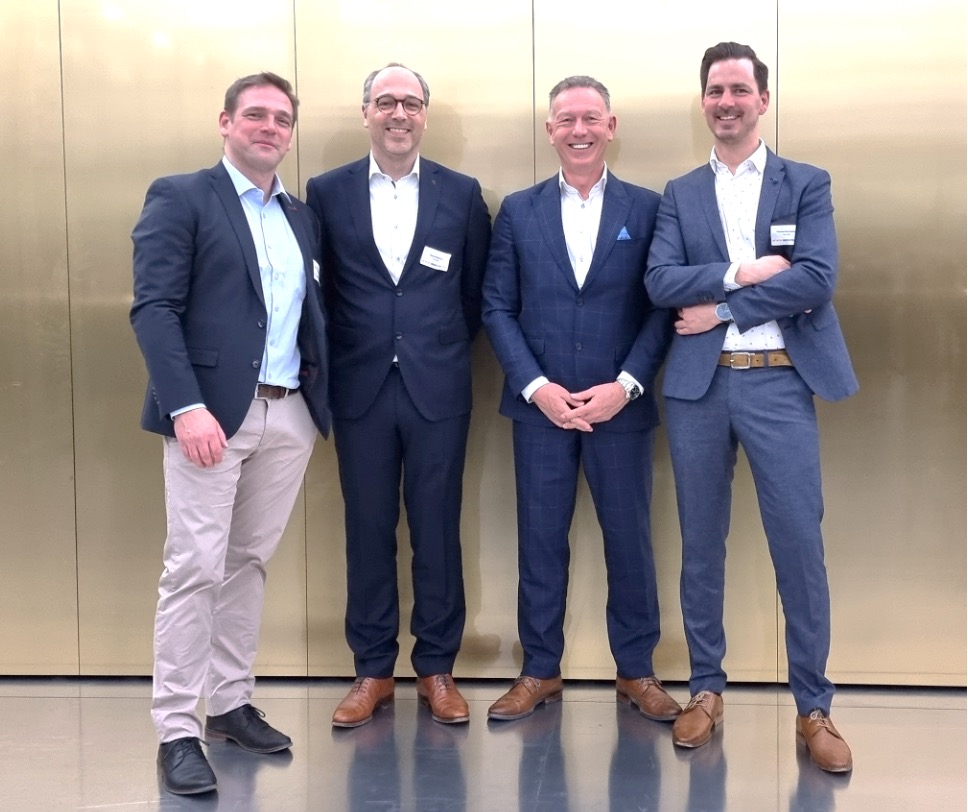Mass data collection only meaningful if you do something with it
Analysing data to optimise production and maintenance processes
The name The Grain refers to an old story about the origins of chess, in which creative thinking is an essential theme and makes exponential growth possible. The company’s website lists the Checkmate and Provideor planning software as products, but these are actually just derivates from the real product: grey matter.

The interdisciplinary team at The Grain uses that grey matter – brain cells – to develop customised artificial intelligence (AI) solutions for industrial companies. Interdisciplinarity came about when Thomas Meersseman, Steven Raekelboom, Dirk De Nutte and Pascal Bejstrup decided to join forces four years ago. Meanwhile, The Grain has grown into an SME with some fifteen employees.
“Steven and I had already founded Provideor ten years ago. We focused on analysing and using data from supply chain processes to optimise both inventory management and distribution,” says COO Thomas Meersseman. “Of course, applications of this kind have existed for some time, but they were mainly developed for large-scale companies, with large numbers of identical or very similar products per channel. Our first customers were pharmaceutical and media companies. They distribute their products through a much finer network. Small pharmacies need just one or a handful of boxes of certain medicines per delivery – but almost immediately – and small newsagents only need a few copies of certain magazines and even newspapers. Because we had to work for this scale, what we did was fairly new. But we did see that in these sectors, too, the attention for recording data and the demand for its practical use increased. And gradually we also received a growing number of requests from the manufacturing and process industry.”
Pooled expertise
As pure data specialists, Thomas and Steven noticed that, in order to offer total solutions to industrial companies, they needed additional expertise on the practical operation and maintenance of machines and the course of manufacturing processes. “This is how the cooperation with Dirk and Pascal came about. They evolved in the opposite direction. From their technical background, they were looking for people who were familiar with data analysis.”
De Nutte and Bejstrup previously worked for an international company, the Allied Reliability Group, active in proactive maintenance to predict the operational reliability of installations through condition monitoring. From their own specific backgrounds, they had seen the opportunities that the use of registration data could offer for fine-tuning predictive maintenance and other optimisations of the business processes.
“We got to know each other during a joint project,” Meersseman recalls. We hit it off immediately and decided to join forces. That was in mid-2019. A few months later, the corona crisis broke out, which hampered all economic activities with site visits. Despite this strong delaying factor, we still managed to complete a nice trajectory during that period.”
Remarkable for a company that is entirely Flemish-owned and based in the heart of Antwerp is the purely English-language website. “Yet that is a logical choice. We want to work internationally and more than half of our customers are foreign or have their headquarters abroad,” Meersseman argues. “For example, one of our first customers was the Finnish steel company SSAB. “It is also a great example of combining data analysis with the practical management of industrial plants.”

Proof of ability
“There was a problem in the hot rolling mill of his factory in Sweden. When rolling up the thin sheets of rolled steel, there were occasional problems with the exact positioning. When this led to cluttered steel coils, there was a financial loss, as you cannot sell such coils at the same price as elegantly rolled steel sheets. Moreover, the production lines then had to be adjusted manually. That, in turn, brought along safety risks and the need to interrupt production.” Therefore, The Grain developed an AI application that alerts the operators when the risk of errors increases.
“Using various sensors, we record all useful data. But where do you set the alarm threshold? For this we need not only our own practical knowledge, but also feedback from the operators. In our software, we have built in the option to add them precisely. In this way, the system learns to recognise false alarms and is continually fine-tuned. SSAB will continue to roll out this application to its other branches in the future.”
Luminus
Closer to home, in a completely different sector, there was electricity supplier Luminus. The energy sector in general is striving to make electricity production more sustainable. One of Luminus’ own power plants is its steam and gas power plant along the Ringvaart canal in the Wondelgem district of Ghent. Such a plant has both a gas turbine and a steam turbine. Luminus uses the residual heat from the gas turbine to drive the steam turbine. This increases the efficiency.
Various factors determine the power output of the plant. One of the most important is the performance of the air condenser, which is responsible for cooling. “Theoretical models already existed that provided insight into the performance of the air condenser. But all these models are quite general and do not take into account environment-specific factors such as the amount of sunlight, the wind direction, the outside temperature and even the amount of pollen in the air, which has an impact on the contamination of the air condenser. We built a model that does. It is now undergoing a trial run in Wondelgem. We are convinced that Luminus will eventually be able to use it in other steam and gas power plants,” says Meersseman.
That hot summer
When Luminus enlisted the help of The Grain, the energy company was already familiar with keeping track of measurement data. Electricity producers are subject to all kinds of obligations: for example, they have to inform Elia, the manager of the Belgian high-voltage grid, in advance and with considerable accuracy, how much electricity each power station will inject into the grid at what time. Elia needs these data to ensure the balance of the grid and security of supply. “We had built a fairly accurate model for Luminus, but in the summer of 2019, we had it completely wrong. The model was trained on a large history of measurement data, but we had not experienced a heat wave like the one in the summer of 2019 in 20 years,” Thomas Meersseman explains. “Such a situation is a good example that you should not blindly trust only a model. An algorithm makes a prediction based on what it has observed in the past, but you also have to teach it to deal with unexpected data and build in safety margins – especially when such a model is used to support operational decisions.”
Open source
The Grain has no ambitions to reinvent hot water. “Some of the software solutions we have developed we have built ourselves, but we also rely on technologies available on the market. We prefer open-source technology, but, when necessary, we also implement existing commercial software components in our applications. Much depends on what exactly a customer asks for. Usually, these demands are about support rather than the exact background of what we offer.”
Meersseman also underlines the need for intensive cooperation with the employees of the companies that The Grain assists. “We don’t barge in with algorithms that immediately provide a magic solution,” he says. “It is important to us to first get a clear understanding of the customer’s process and the problem or challenge he is struggling with, before we start working with data. Since the customer himself knows his process best, his engagement is crucial. Once we understand the problem, we propose a solution and see what data elements are available that could contribute to it. These can be sensor measurements of production processes, but also quality data or historical sales data. The added value often lies in cleverly combining different data elements to reveal new insights. Managers and board members often help to clarify the business case. For example, a business case might be to reduce the breakdown rate of a production process by 5%, but it is mainly the process experts and operators who will provide hypotheses on what has an impact on breakdown. Our analysts then search for the right data elements to validate those hypotheses.”
Open possibilities
The Grain focuses on production and distribution companies. “There are still many opportunities, because many companies have only just started collecting data and still have to make the step to data analysis. For the manufacturing industry, we have developed Checkmate, an advanced tool that supports the production planner in his daily tasks. This is our response to a current trend: products are increasingly customised, and orders can be changed right up to the last minute. Adjusting production to this can be a stressful and above all time-consuming task nowadays. The supply problems that almost all manufacturing companies are facing also make us very topical. Checkmate can take all these parameters into account and quickly calculate the most optimal production plan. What used to take several days can now be done in a few hours.”
“We know our limits. Data analysis can be useful in many fields, industrial processes are our thing. We stay away from sectors where we have too little background knowledge. So don’t ask us to optimise the processes of, say, a bank.”
Can automation make up for labour shortages?
“What we do and offer will not solve the current shortage of skilled professionals,” believes Thomas Meersseman. “But it can help to use the available labour force as efficiently as possible. I like to make the comparison with how the healthcare sector uses AI systems today to detect abnormalities on CT scans, for example. It is not the AI system that makes the diagnosis, but it does enable the doctor – as an expert – to make the correct diagnosis much more quickly. In the same way, you have to look at people working in a factory. Within the factory walls, they are the experts who know better than anyone how their production process is structured and how their machines work. They, too, have to make decisions and perform actions every day that ensure production runs as efficiently as possible. Tools that handle data intelligently can support them in this.”
This article is courtesy of The Grain

The Grain is a data science company focused on building AI applications for the industry.
We enable companies to have a lasting impact by making analytics usable, scalable and visible within operations. We unlock human potential by embracing technology and supporting your workforce in doing their day-to-day tasks better, faster, and smarter.
